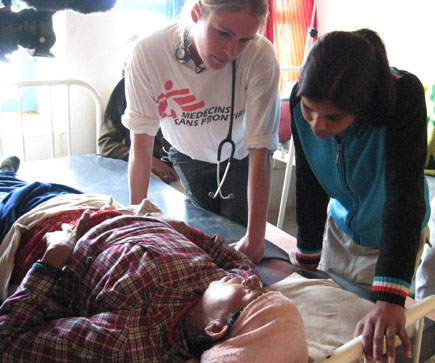This is a little rumination I've been sorting out, so apologies upfront for the rudimentary nature. If I've been workshopping in my head, BttN seems to be a good spot to lay everything down and geek out.
I've been spending some time thinking about the multitude of ways planners can contribute to change; learning about the situation in Haiti has made it more immediate. (To be honest, I was also inspired by the Bauhaus exhibit at MoMA where examples abound of workshopping and testing the flex of combining multiple disciplines to contribute to society.) Other professions have figured out a succinct and valuable way to apply the skills of their profession for public service. Examples of those groups include Medicins sans Frontieres/Doctors Without Borders, Union of Concerned Scientists and Architecture for Humanity. There are myriad smaller organizations that do similar work: engineers working on eradicating TB, architects working on affordable, community-based sustainability, for example. All of these groups are emblematic of specific knowledge and skills applied to a specific situation. Sometimes the need is much more immediate, as in Haiti. Other times, it's a longer-term need. Doctors may be the only profession with a common oath; however, it seems that the creation of the organizations is an implicit recognition that many other professions also have distinct power through their specific knowledge to save lives and make people's lives better.
What would a so-called Planning Corp do? Sorting through this brings up more questions than answers. Fundamentally, what do planners do? They help make decisions about how the built environment will be formed, how the natural and built environments will relate to one another, and all with the goal of making people's lives better. Planners collect data, and conduct research and analysis against an understanding of space. How does planning happen? Through a series of decisions, sometimes through an established public process or a private development process, usually a combination of both. How do those decisions get made? What's required to make them? Yikes. The arc of planning always seems long-term; what do planners have to offer in the short-term?
(In disaster situations, there must be (hopefully?!) a typology of responses that has been established among relief agencies. The process of response also carries with it a geo-political context. For example, without knowing the particulars, the decision to cede control of the airport to the U.S. seems loaded. Who gets to go into Haiti - what groups? Who receives access to resources to set up and has legitimacy to be there? Who decides?)
Planners often get lumped with architects and designs. A quick look through the Architecture for Humanity opportunities list shows that the focus on the building facility first; the design process proceeds from that starting point. Architects probably take on a huge amount of the planning responsibilities too, but it's hard to know where that starts and ends. There's Architects, Planners and Designers for Social Responsibility too; role? It would be interesting to follow-up with folks who worked on the Katrina reconstruction and see what lessons and best practices could be found.
I think it's dawned on everyone that the practice of planning needs to extend beyond the effort of making the planning process more inclusionary - or maybe the definition of inclusion needs to be expanded. Though that aspect of planning is absolutely necessary, planning as a discipline seems to have to make a bigger change than just getting community input per se.
Outside of physical design, planners also deal with a lot of data - from how it's defined to how it is collected to how it is communicated. I've become more and more curious about open data and the politicalization of analysis and access, thanks to the nudging of a couple of good folks in NYC. I guess it's about time! In this vein, the CrisisCamp response to the Haiti situation seems extremely appropriate and efficient. The application of data across space is very much an exercise in planning - but participation seems very much defined by computer program developers, not planners (the CrisisCamp folks made a great effort to include a role of non-techies in the projects).
Mobile app developers working on Creole/English tool at Haiti CrisisCamp DC
So I'll put it out there: what do you think a Planning Corp would do? If planners had to band together to respond to crisis, to injustice, to social change, in the long-term and short-term, what would they bring to the world? Sometimes I try something more specific: what would the Hippocratic Oath be for planners? And finally, what's missing here?
1.18.2010
In public service
Posted by Shin-pei at 12:51 PM
Subscribe to:
Post Comments (Atom)
2 comments:
Enjoyed your post -- found you through CrisisCamp. Apologies for geeking out ;-) One thing that Planning Corps might do is construct Google Earth models show before-and-after development over time (3D? 4D?). I've also found that economic development agencies are good at bringing together constituencies, taking-in ideas from stakeholders, and "fabricating" those ideas into plans, models, animations, etc. -- to take an idea and "build" it in a variety of ways. Your post brought to mind a show on HGTV (Designer Challenge?). Planning Corps could offer-up a variety of ideas, and stakeholders could comment, discuss, and "vote" on the pros and cons. The result would be practical and stakeholders would have some "ownership" of the plan/design.
I love geeking out! Glad you found this. Great ideas. I think some aspects are being explored by the planning community now. I'm really into the idea of presenting new ideas and having people vote for them; this would expand part of the participatory planning process.
Post a Comment